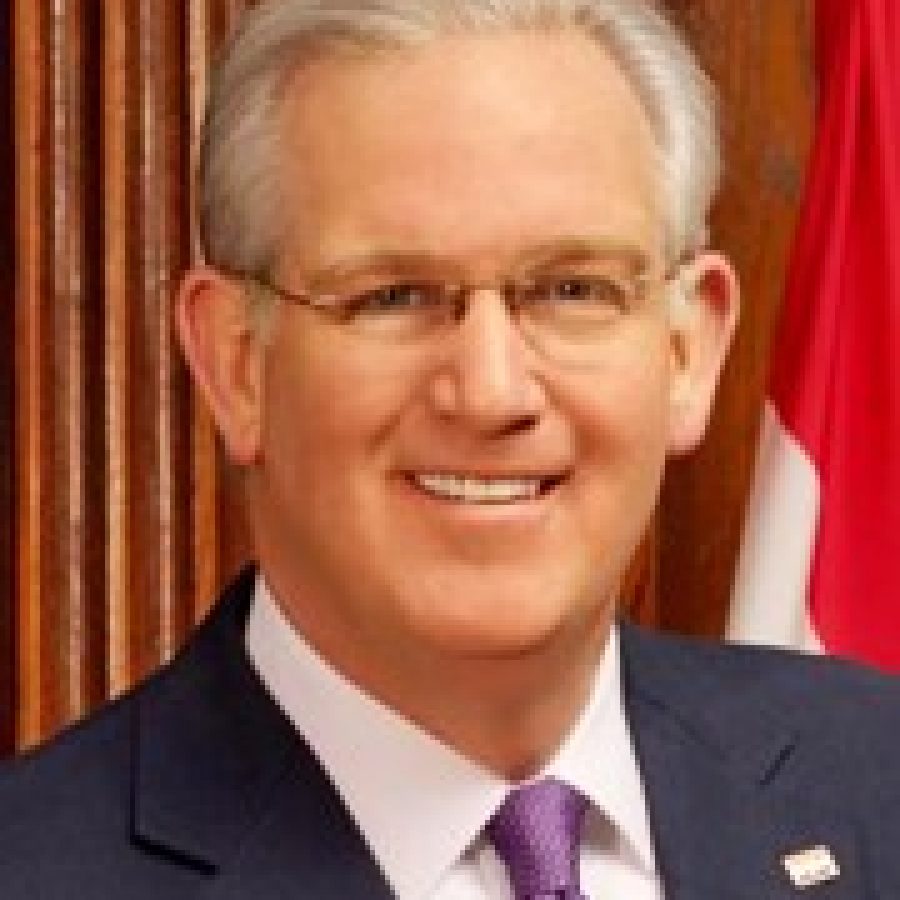JEFFERSON CITY — Gov. Jay Nixon now is tied for suffering the greatest number of non-budget veto-overrides in a single year in Missouri history.
On Wednesday, the Missouri Legislature overrode 10 of the governor’s vetoes. Coupled with the two vetoes overridden in the spring, it ties the 1833 record for legislative rejection of a governor’s vetoes of non-budget items. In all, 12 of the 18 bills Nixon vetoed will become law.
In total during the course of his administration — including both budget and non-budget veto overrides, Nixon has suffered the largest number of legislative defeats.
Among the major vetoes overridden in 2015 are bills that would allow higher charges for some consumer loans, restrict cities from raising minimum-wage requirements or banning plastic grocery bags, give police powers to private security guards, limit unemployment benefit coverage, continue a tax break for large laundries and ban a college scholarship program for some children of illegal/undocumented foreigners.
Labor issues dominated the final hours of the veto session with the General Assembly handing Nixon a major defeat, but also a major victory.
In the afternoon, the House sustained the governor’s veto of the “Right-to-Work” bill that would prohibit requiring a person to be a union member to hold or keep a job.
But later in the evening, the Senate joined the House in voting to override the governor’s veto of a measure that will cut the number of weeks a person can collect unemployment compensation during periods of high employment in the state.
Nixon’s vetoes that the Legislature overrode are:
SS HCS HB 63 [
;: Exempts some local governments from a state law imposing requirements on primaries. The measure prohibits a fomer school district superintendent from running for the district’s school board. Nixon wrote in his veto letter that the law should encourage rather than prohibit those who aspire to serve in public office.
HB 150 [
;: Reduces the number of weeks a person can get unemployment benefits when the unemployment rate drops. During periods when unemployment drops below 6 percent, the maximum number of weeks for benefits would be cut from 20 weeks to 13 weeks. Nixon charged in his veto letter that the reduction would inflict additional pain on persons out of work.
SCS HCS HB 618 [
;: Gives a funeral director power to let a majority of those with equal priority determine the disposition of a dead body if there is a disagreement. The final version of the bill expands the types of licensed professionals who can issue death certificates including advanced practice nurses. Nixon wrote in his veto letter that expanding who could issue death certificates could put vital records at risk.
SS HCS HB 722 [
;: Prohibits local government from requiring a minimum wage that is higher than what is required by state or federal law. It also prohibit cities from banning stores from offering plastic bags. In his veto letter, Nixon termed the bill an intrusion and unwarranted interference with the power of local government.
SCS HB 878 [
;: Gives the Public Safety Department authority to commission corporate security advisors. It would deny licensed corporate security advisers arrest powers unless they are commissioned by the department. It grants immunity to the department from lawsuits for commissioning corporate security officers. Nixon’s veto letter argued that the bill would give private security officers police powers including the power of arrest and to search private property.
HB 1022 [
;: Lets an insurance policy provide a refund for a person who has not had a claim within a defined period of time by declaring that such refunds would not be considered an unfair trade practice. Nixon’s veto letter cited a provision in the bill that would give an insurance company the right to not disclose to a policy holder the provisions for refunds.
HCS HB 1098 [
;: Makes various changes involving out-of-state banks and trust companies. It would allow an out-of-state institution to avoid a Missouri requirement for the minimum capital required if the company meets the requirements in its own state. In his veto letter, Nixon wrote that provision would cause Missouri financial institutions to face stronger requirements than competing non-Missouri firms operating in Missouri.
SB 20 [
;: Provides a sales-tax exemption for energy, machinery and material purchases by commercial laundries. In his veto letter, Nixon termed it poor tax policy to award a tax break to businesses that wash dirty clothes, but deny the same tax break to other types of companies.
CCS SB 24 [
;: Imposes work-program restrictions on welfare programs. It expands the requirement for seeking a job as a requirement for receiving food stamps and imposes a 45 month lifetime limit for TANF, or Temporary Assistance for Needy Families. In his veto letter, Nixon said the measure punishes poor children and jeopardizes their lives.
SS SB 142 [
;: Requires the Natural Resources Department to file a regulatory impact statement with the legislature at least one month before submitting any implementation plan to the federal Environmental Protection Agency. Nixon’s veto letter claims the bill contained drafting errors including reference to a federal law that does not actually exist.
SCS SB 224 [
;: Restricts the A+ scholarship program for college students to U.S. citizens or permanent residents in the U.S. In his veto letter, Nixon wrote that the bill would penalize students who came to the United States through no choice or action of their own.
SCS SB 345 [
;: Raises various fees charged by the Division of Finance that regulates banks and other types of financial institutions. The final version of the bill increases the maximum fee a lender can charge for some types of loans. Nixon wrote the increases would have the greatest impact on people of limited means who take out relative small loans.
Also see the list of vetoed bills with links to the veto letters and rollcalls [
;. [
;



